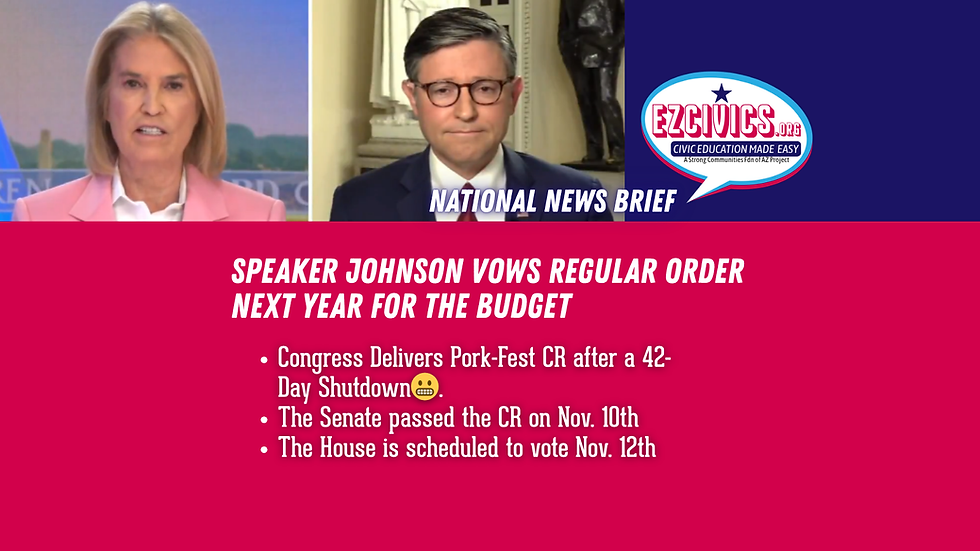Speaker Johnson Vows Regular Order Next Year for the budget
- EZCivics

- Nov 11, 2025
- 3 min read
Summary: Congress Delivers Pork-Fest CR after a 42-Day Shutdown😬. The Senate passed the CR on November 10 by a 60-40 vote; the House is scheduled to vote after procedural steps on November 12, with the future path of Congress still uncertain.

NATIONAL - Speaker Mike Johnson said the package for Congress's Continuing Resolution (CR) is to buy time, "extended to January 30 to continue our work through regular order appropriations."
His announcement falls on Veterans' Day with the CR providing a full year of funding for "veterans and farmers — and back pay for every federal worker hurt by the Democrat Shutdown," he posted on X.
Sen. Rand Paul says the process of reopening the government comes at a great cost with the waiver of PAYGO:
"Less chaos is a good thing but hidden deep in the swamp speak of the Republican bill will be a waiver of PAYGO the long-standing law requiring new spending to be offset with cuts. And so it goes, a trillion here a trillion there. $38 trillion in debt and counting. A depressing outcome."
What is Regular Order?
Speaker Mike Johnson's renewed pledge to restore constitutional regular order in budgeting highlights a fundamental dispute about the government's role, transparency, and the boundaries of federal power.
Regular order occurs when Congress passes the 12 individual appropriation bills that comprise the Federal budget. Instead, for the last 28 years — since 1997 — Congress has resolved budgeting disputes through large, single-bill funding mechanisms, known as continuing resolutions and omnibus bills.
Why Regular Order Matters?
As the country approaches day 42 of the shutdown, Rep. Thomas Massie recently reposted a 2018 video explaining how regular order prevents shutdowns, describing each appropriation bill as a financial "hostage" managed by Congress.
Massie explained that he believes there are really only five out of 12 categories of appropriation bills that are usually controversial. He argues that the CR and omnibus process give leadership more power, while regular order gives elected members more power to represent their constituents.
More member participation means citizens have genuine opportunities for oversight and input.
A 2020 Congressional Research Report titled "The 'Regular Order': A Perspective," largely agrees with Massie's assertions:
"Regular order is a lawmaking process that promotes transparency, deliberation, and the wide participation of Members in policy formulation. At its core… regular order meant 'that everybody gets to participate in the process' through committee activities and floor amendments." (p.1)
"Rank-and-file lawmakers have fewer opportunities 'to participate in the deliberative work of Capitol Hill' because party leaders have 'come to dominate the [policymaking] process.'" (p. 2)
Is the CR Really "Clean"?
Despite calls to restore regular order, this year's shutdown ended with another CR packed with politically targeted provisions, special privileges, and exceptions that sidestep constitutional ideals:
Imposes strict new bans and regulations on hemp-derived products, preempting state law and sparking bipartisan criticism, including from Sen. Rand Paul.
Grants lawmakers a special right to sue the government for surveillance without notification—a privilege not extended to ordinary citizens.
Preserves existing funding for programs like SNAP but leaves other core areas, such as Affordable Care Act tax credits, unresolved, as Democrats wanted to add $1 trillion in spending to fund them.
Provides back pay for furloughed federal workers and reverses layoffs, but only to the extent allowed in the CR text.
Includes piecemeal appropriations for select priorities (Supreme Court security, disaster relief, etc.) with no guarantee of future openness or restraint.
Who Won? Who Lost?
Republicans largely set the terms, blocking Democratic priorities like expanded ACA subsidies, while retaining spending limits and adding new policy riders.
Democrats secured the restoration of pay and benefits for government workers, undoing some of the cost-cutting measures implemented by President Trump's OMB Director, Russ Vought, during the government shutdown. Democratic leadership accepted a compromise that left core progressive priorities unresolved for the time being.
The biggest loss was the pain endured by regular Americans, who suffered economic harm without seeing meaningful reform or accountability. Government workers and contractors bore the brunt of the hardship, and business losses went uncompensated.
Public reaction was one of anger across the spectrum—conservatives claimed fiscal vindication, progressives lamented a retreat, and independents denounced dysfunction.
Bottom Line
Congress's reliance on crisis budgeting and a "not-so-clean" CR further erodes the principles of self-government, maximum liberty, and personal responsibility.
Until lawmakers return to the full transparency and accountability of regular order, citizens stressed across social media that they remain at the mercy of political brinkmanship—not the participatory process the Constitution intends.
The Senate passed the CR on November 10 by a 60-40 vote; the House is scheduled to vote after procedural steps on November 12, with the future path of Congress still uncertain.
________
EZcivics.org is funded by our readers. If you found this news brief educational, consider chipping in to fuel our work by going HERE.




